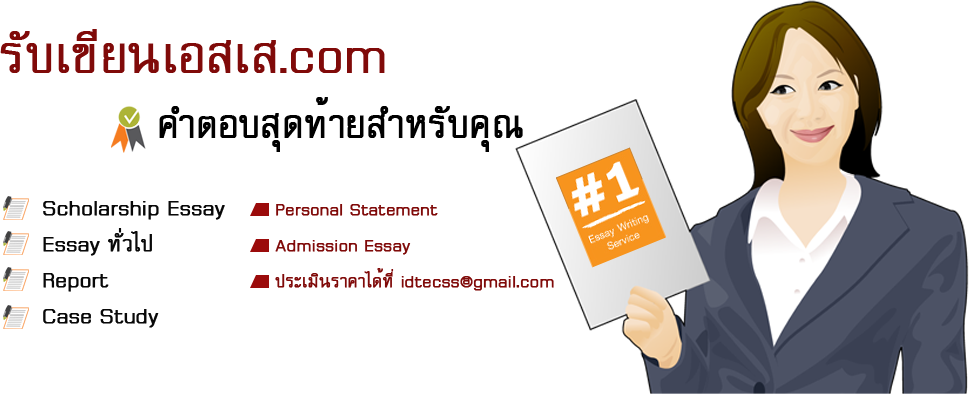
วิธีเขียน Scholarship Essay พร้อมตัวอย่าง
การเขียนเรียงความเพื่อสมัครขอทุนการศึกษา-SCHOLARSHIP ESSAY
การเขียนเรียงความเพื่อสมัครขอทุนการศึกษาในเนื้อหาควรต้องมีข้อมูลสำคัญเกี่ยวกับตัวเรา ประกอบไปด้วยทักษะที่เรามีประสบการณ์ ความสำเร็จ เป้าหมายในชีวิตของเรา
โดยมากคณะกรรมการต้องการรู้เกี่ยวกับตัวเราและทัศนคติในการใช้ชีวิตของเรา เราอาจกล่าวถึงบุคคลที่เป็นแรงบันดาลใจในการใช้ชีวิตกับเรา ความยากลำบากในการชีวิตของเรา สิ่งที่เคยล้มเหลวและประสบความสำเร็จในชีวิตคุณ
นอกจากนี้สิ่งสำคัญอีกข้อคือเราต้องมีความรู้ที่แน่ชัดพอเกี่ยวกับทุนที่เราจะขอ เช่นผู้ก่อตั้งทุน วิสัยทัศน์ภารกิจขององค์กรที่จะให้ทุน เราควรเขียนจุดเด่นในตัวเราที่จะทำให้คณะกรรมการตัดสินใจเลือกเรา
Scholarship Essay
Purpose: To demonstrate that you are the best candidate to receive a scholarship.
Introduction: Introduce yourself or the topic of the essay.
Body: Provide the evidence to support the thesis, or the explanation which supports your opinion, depending on the writing task given.
Conclusion: Summarize the points made, and leave a strong closing idea for the reader.
Language: Active, vivid and accurate. Don’t exceed the word count.
Other considerations: It is vital to know as much as possible about the institution and the scholarship itself in order to make connections between these and your own application. The university may ask a specific question for this essay, so be sure to answer it.
>>> สั่งงานเขียนกับ Native Writer งานคุณภาพ แกรมม่าเป๊ะ คลิก! >>>
เขียน Scholarship Essay
เขียนบทความเพื่อชิงทุนการศึกษา ระดับมหาวิทยาลัย และเพื่อขอทุนการศึกษาในต่างประเทศ
The essay with which you convince the scholarship committee to grant you the scholarship is called scholarship essay. Scholarship essays vary greatly in subject matter or theme. However, most of them require a recounting of personal experience. The most significant feature of your scholarship essay is the subject matter. It is vital to devote a few weeks simply brainstorming different ideas, since this will be one of the key factors, which will affect the decision of the scholarship committee.
The most important aspect of the scholarship essay is the subject matter. You should expect to devote about 1-2 weeks to brainstorming ideas. From brainstorming, you may find a subject you had not considered at first. Next step is selecting an Essay Topic. Having completed step one, you should now have a rough idea of elements you wish to include in your scholarship essay, including your goals, important life experiences, research experience, spectacular nonacademic accomplishments, financial need and etc. It is also important for you to have an idea of what impression you want to make on the scholarship committee. It is vital for all applicants to consider topics that will allow them to synthesize the important personal characteristics and experiences into a coherent whole. While most scholarship essays allow great latitude in topic selection, you must also be sure to answer the questions that were asked of you. The last step is writing the essay.Even seemingly boring topics can be made into exceptional scholarship essays with an innovative approach. In writing the essay you must bear in mind your two goals: to persuade the scholarship officer that you are extremely worthy of receiving college assistance and to make the officer aware that you are more than a GPA and a standardized score, that you are a real-life, intriguing personality.
ตัวอย่างการเขียน Scholarship Essay
Jack Walker Scholarship in Industrial Chemistry at the University of Blackburn
I can imagine now that the last class of the week on a Friday afternoon is not one for which teachers have any particular fondness, despite the promise of freedom that lies after the final bell. For my twelve-year-old self, the weekend was the light at the end of the very long tunnel that was double chemistry with Mr. Walters. The Friday I remember so vividly was in winter; the light was already fading and it would be dark before I got home. It always seemed that the best and brightest part of the day was wasted in school – until Mr. Walters introduced me to the alkali metals.
On the laboratory bench were three small jars, opaque, with tightly sealed lids. Taking a pair of tongs and opening the first, Mr. Walters took a small grey lump of metal and then cut it with a scalpel! To me, metal had always meant steel, or maybe aluminium or even gold – never something soft – and yet this small hunk of lithium was sliced so easily, and then began to tarnish the moment its shining, freshly cut surface was revealed. Mr. Walters, his eyes shielded behind a thick pair of safety goggles, dropped the metal into a beaker of water. Of course, it began fizzing and buzzing around the container before exploding with a small “pop”. I was enthralled, even more so when Mr. Walters demonstrated the effect with sodium and then potassium. That night I asked my father what might become of rubidium, caesium and even francium. I wanted to see more, to know more, to be a chemist.
Later, I had the chance to ask Mr. Walters why he had become a chemistry teacher, and he explained that he had begun as an industrial chemist, but became disillusioned and switched to teaching. It made me think about the purpose of education, about why we try to learn, or why some become teachers. I believe that education is all about equipping people to help themselves; to help their families; to help their communities; and perhaps to help their countries or the world. Mr. Walters had used his industrial career to support his family, but wanted to do something more for his community so turned to teaching. I believe that Jack Walker may have experienced similar emotions in setting up this scholarship to make his contribution to his community and country using the wealth he earned in the steel industry.
My own objective in applying for this scholarship is to equip myself with the means of accomplishing my goal of serving my family, my community and my country through determination and hard work. To date, my school grades in chemistry, physics and mathematics have been outstanding and I have received a number of local awards for my work in science fairs and academic projects. However, these do not represent the limit of my ability or ambition. My mentor, Mr. Walters, may not yet have fulfilled the ultimate academic goal of helping his country through his work and his achievements, yet if I can make that breakthrough as a result of his inspiration, the credit will go to him, to Jack Walker and to the University of Blackburn. The four reasons for education outlined earlier in this essay are merely purposes. Motivation is the final ingredient which can bring success, and I can assure the committee that I will do my utmost to use the education I am given to the best of my ability and to repay the trust placed in me by Mr. Walters and Mr. Walker, whom I believe have so much in common.
>>> สั่งงานเขียนกับ Native Writer งานคุณภาพ แกรมม่าเป๊ะ คลิก! >>>
